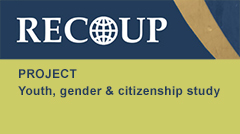Youth, Gender and Citizenship Study

This inter-generational gender study investigates whether and how education helps male and female youth in poor communities achieve participatory citizenship. It investigates how education can help youth and their communities protect themselves, make decisions, achieve an independent livelihood and participate in community life. Using qualitative methods, it examines
- How young men and women living in poverty construct their identities and how such identities mediate the effects of schooling and opportunities for enacting citizenship.
- The extent to which young people's strategies to break out of poverty are differentiated by gender and by schooling.
- The extent to which schooling can offer more opportunities to break out of poverty for young men and women than it does or did for their parents.
Related links:
Working Papers:
Gendered Experiences of Teaching in Poor Rural Areas of Ghana
Globalising the School Curriculum: Gender, EFA and Global Citizenship Education
Decentring Hegemonic Gender Theory: the Implications for Educational Research
Researching Gender: Exploration into Sexuality and HIV/AIDS in African Contexts
Rates of Return to Education by Gender in Pakistan
Global Gender Goals and the Construction of Equality
Female Autonomy and Gender Gaps in Education in Pakistan
Youth citizenship, national unity and poverty alleviation: East and West African approaches to the education of a new generation
Policy Briefs:
Gender equality in education - increasing the momentum for change
Oduro,G. Y. and Arnot, M. (2010) Sexuality and HIV/Aids Education: Addressing
the Knowledge - Practice Gap amongst Marginalised Ghanaian Youth No.11
Lukalo, F.K. and Arnot, M. (2010) Schooling All Children: The Policy implications
of Mothers’ Educational Decision-making, No. 13
Chege, F.,Arnot, M. and Wainaina, P. (2010) Improving Educational Outcomes: Youth as Poverty Expert, No.14.
Casely-Hayford,L.,Arnot, M., Dovie, D., and Salifu, Ed. (2010) The Education-Outcomes Gap for Youth in
Ghana: Addressing Raised Expectations, No. 15.
Arnot, M., (2010) Promoting Substantive Gender Equality in Education: Youth Citizenship No. 17
Conference papers:
Arnot, M. and Casely Hayford, L., (2010) ‘The education outcomes gap for youth in Ghana: implications for government, development partners and civic society’ RECOUP Dissemination Conference, Cape Coast, September 27-29th. 2010.
Arnot, M. (2010). Forging a feminist approach to global citizenship education: contemporary conflicts between human rights and Southern perspectives. Keynote paper at Gender and Education Annual Seminar 11 January 2010, Gender and Development and Multicultural Venues for Health and Education, University of Bergen.
Arnot, M. (2010) ‘Global citizenship education and equality: gendered hegemonies, tensions and a global gender ethic’ Changing Societies – Values, Religions and Education, UMEA University, Sweden 9- 12th June 2010.
Arnot, M. (2010) ‘Forging a feminist approach to global citizenship education: contemporary
conflicts between human rights and Southern perspectives’, Gender and Education annual
seminar Gender and Development and Multicultural Venues for Health and Education, University of Bergen, Norway. 11th January 2010 .
Wawire, V., Wainaina, P., Chege, F. & Arnot, M. (2008). Conceptualising poverty and well-being in the context of education: local meanings and perceptions from urban and rural Kenyan communities. Paper presented at Nairobi RECOUP conference November 2008.
Ruto, S., Likoye, F., Chege, F. & Arnot, M. (2008). Being young, Kenyan and gendered: constructions of schooling outcomes in urban and rural settings. Paper presented at Nairobi RECOUP conference November 2008.
Arnot, M. (2008). Educating Young Citizens: social discrimination, gender equality and global democratic issues. (Paper presented to the State Council for Educational Research (SCERT) Conference on Democratic and Secular Education: Kerala in the International Context 4-6 December 2008) - published in Conference Proceedings. 4-6 December.
Arnot, M., Casely-Hayford, L., Chege, F., Dovie, D.A. & Wainaina, P.K. (2008). Youth citizenship, national unity and poverty alleviation: East and West African approaches to the education of a new generation Youth Citizenship, National Unity and Poverty Alleviation: East and West African approaches to the education of a new generation. Conference on Educational Quality and Outcomes in Ghana and Africa, Accra 9-10th ?
Fennell, S. & Arnot, M. (2007). Gender equality agendas in education: Contemporary research, contemporary feminist critiques. Paper presented at the UKFIET Conference on International Education and Development, 11-13 September 2007, Oxford.
Casely-Hayford, L.. Arnot, M., Chege. F., Delali, D. & Wainaina P. (2007). Conceptualising the relationship between youth, citizenship and poverty alleviation: East and West African approaches to the education of a new generation. Paper presented at the RECOUP Symposium, 'Going for Growth' UKFIET Conference on International Education and Development, 11-13 September 2007, Oxford.
Samson, M., Noronha, C. & De, A. (2007). Building unequal capabilities among Delhi's youth: Preparation for future roles through schooling, training and work . Paper presented at UKFIET Conference on International Education and Development, 11-13 September, Oxford.
Arnot, M. (2007) set up a symposium which I chaired and acted as discussant for the ‘Schooling girls for citizenship: the contradictions and dilemmas in an unequal world’? 4th Global Symposium: ?Awakening Planetary Consciousness December 7-10, 2007 Lucknow, India
www.wmgd.net/symposium. A conference aimed at creating a long-term strategy and an international network of civil society, corporate representatives, media, educators and children for securing the future of present generations and those yet to be born.
Arnot, M. (2006) ‘Educating the Global Citizen?’ Invited public address as part of the Vice Chancellor’s Lecture Series, University of Delhi, November .
